Revenue and Yield Management in Travel and Tourism
Added on 2023-01-13
27 Pages4508 Words79 Views
Travel and Tourism
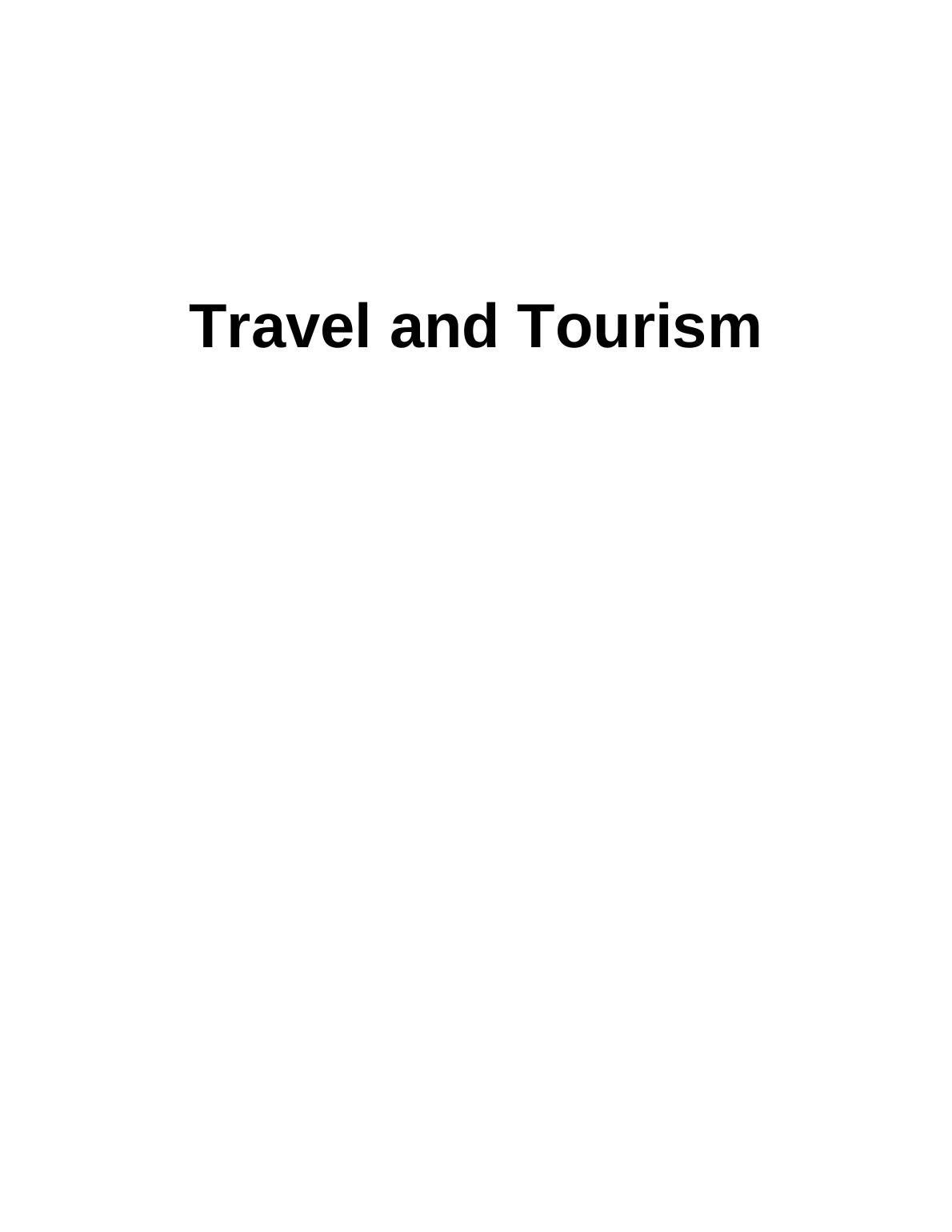
Table of Contents
INTRODUCTION...........................................................................................................................1
PART 1............................................................................................................................................1
Revenue and yield management..................................................................................................1
Rationale and principle of revenue management........................................................................1
Describing how airline industry applied revenue management tool...........................................2
Impact of differentiated pricing strategies on revenue management..........................................3
Critically analyzing the principle of revenue management.........................................................3
PART 2............................................................................................................................................4
..........................................................................................................................................................4
..........................................................................................................................................................6
..........................................................................................................................................................7
..........................................................................................................................................................8
........................................................................................................................................................16
PART 3..........................................................................................................................................18
PART 4..........................................................................................................................................20
Financial statements and reporting mechanism for organizations in travel and tourism industry
...................................................................................................................................................20
Importance and value of budget for controlling business performance....................................21
Interpretations of financial ratios of British Airways and Iberia .............................................22
CONCLUSION..............................................................................................................................22
REFERENCES..............................................................................................................................24
INTRODUCTION...........................................................................................................................1
PART 1............................................................................................................................................1
Revenue and yield management..................................................................................................1
Rationale and principle of revenue management........................................................................1
Describing how airline industry applied revenue management tool...........................................2
Impact of differentiated pricing strategies on revenue management..........................................3
Critically analyzing the principle of revenue management.........................................................3
PART 2............................................................................................................................................4
..........................................................................................................................................................4
..........................................................................................................................................................6
..........................................................................................................................................................7
..........................................................................................................................................................8
........................................................................................................................................................16
PART 3..........................................................................................................................................18
PART 4..........................................................................................................................................20
Financial statements and reporting mechanism for organizations in travel and tourism industry
...................................................................................................................................................20
Importance and value of budget for controlling business performance....................................21
Interpretations of financial ratios of British Airways and Iberia .............................................22
CONCLUSION..............................................................................................................................22
REFERENCES..............................................................................................................................24
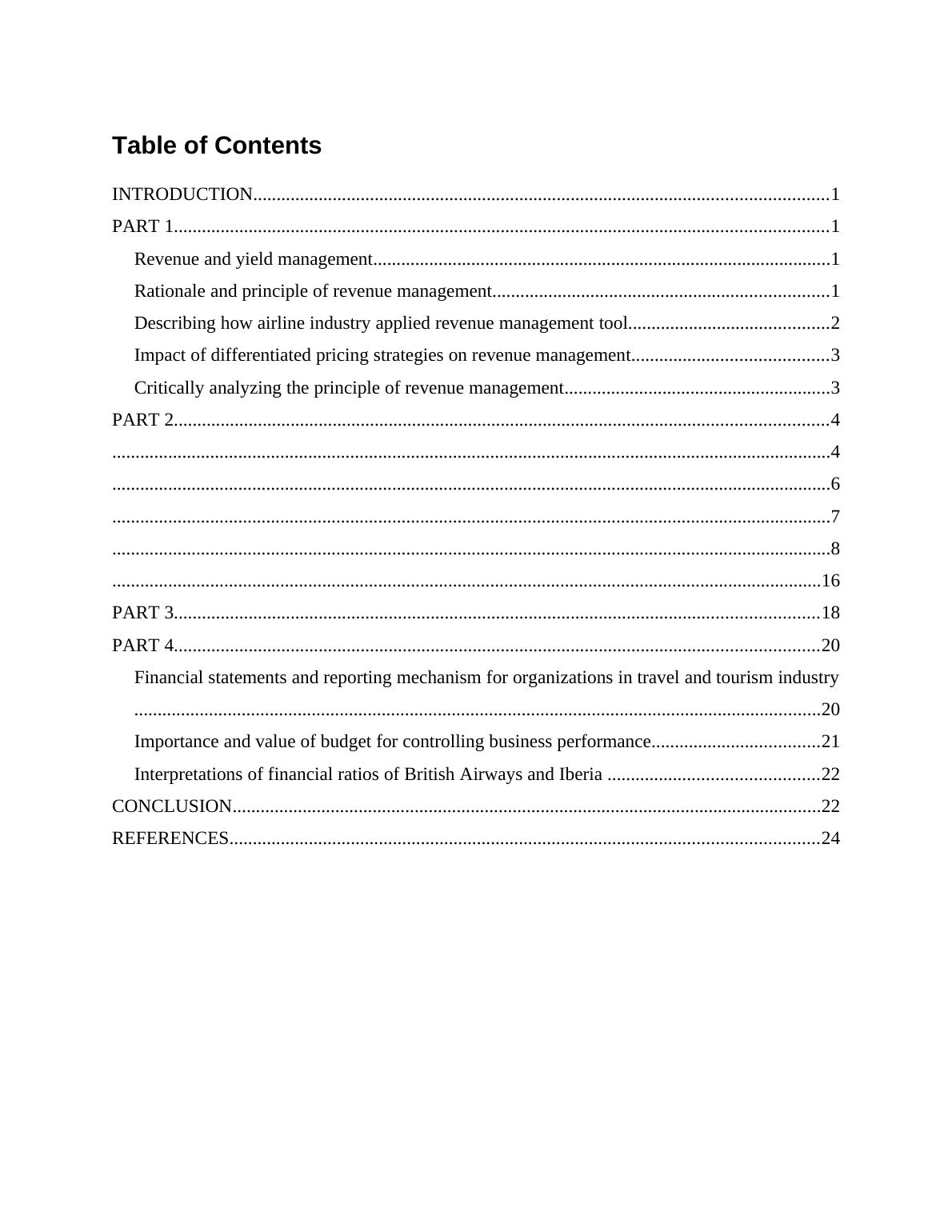
INTRODUCTION
Travel and tourism helps in the economy growth and tourism is travel for pleasure or
business. In the same way, current report Is based upon the scenario of British Airways which is
the UK's largest international scheduled airline and consider one of the world's leading global
premium airlines. Further, study also describe the legislation of British Airways which has to be
adhere and then describe different types of financial statements and reporting mechanism for an
organization. Lastly, it also explain the importance and values of budget controlling business
performance.
PART 1
Revenue and yield management
Revenue management is the overall strategy along with in-depth analytic and forecasting.
While yield management is majorly concerned with enhancing the profit and that is how its gives
the activity to the revenue management by focusing on the improvement of pricing strategy.
Both terms are used by company to reach the goal of maximizing yield and in 1980, it is also
first applied in the airline industry and then its application has reached other passenger transport
industries (Board and Skrzypacz, 2016). Therefore, revenue and yield management are used to
predict demand and other consumer behavior.
Rationale and principle of revenue management
Rationale: The rationale of using revenue management system in travel and tourism
industry is such that it helps to foretell the consumer demand to optimize inventory and price
availability to increase the revenue growth. Further, it means that not sell the tickets today at
low price rather than it, sell the tickets tomorrow at higher price. Other products, amenities, food
and beverage offering will also added to boost revenue growth.
Principles:
value: while managing revenue management in travel and tourism, industry has to
understand the value. Such that to increase the value, managers and leaders has to make
improvement to customer service i.e. food and drink quality, ease of online booking etc.
Direct booking: In travel and tourism, people prefer to use online booking system only
and that is why, to enhance customer loyalty, airline industry also has to develop direct
booking using specific tools and technique (Feldman and Topaloglu, 2017). Or else,
1
Travel and tourism helps in the economy growth and tourism is travel for pleasure or
business. In the same way, current report Is based upon the scenario of British Airways which is
the UK's largest international scheduled airline and consider one of the world's leading global
premium airlines. Further, study also describe the legislation of British Airways which has to be
adhere and then describe different types of financial statements and reporting mechanism for an
organization. Lastly, it also explain the importance and values of budget controlling business
performance.
PART 1
Revenue and yield management
Revenue management is the overall strategy along with in-depth analytic and forecasting.
While yield management is majorly concerned with enhancing the profit and that is how its gives
the activity to the revenue management by focusing on the improvement of pricing strategy.
Both terms are used by company to reach the goal of maximizing yield and in 1980, it is also
first applied in the airline industry and then its application has reached other passenger transport
industries (Board and Skrzypacz, 2016). Therefore, revenue and yield management are used to
predict demand and other consumer behavior.
Rationale and principle of revenue management
Rationale: The rationale of using revenue management system in travel and tourism
industry is such that it helps to foretell the consumer demand to optimize inventory and price
availability to increase the revenue growth. Further, it means that not sell the tickets today at
low price rather than it, sell the tickets tomorrow at higher price. Other products, amenities, food
and beverage offering will also added to boost revenue growth.
Principles:
value: while managing revenue management in travel and tourism, industry has to
understand the value. Such that to increase the value, managers and leaders has to make
improvement to customer service i.e. food and drink quality, ease of online booking etc.
Direct booking: In travel and tourism, people prefer to use online booking system only
and that is why, to enhance customer loyalty, airline industry also has to develop direct
booking using specific tools and technique (Feldman and Topaloglu, 2017). Or else,
1
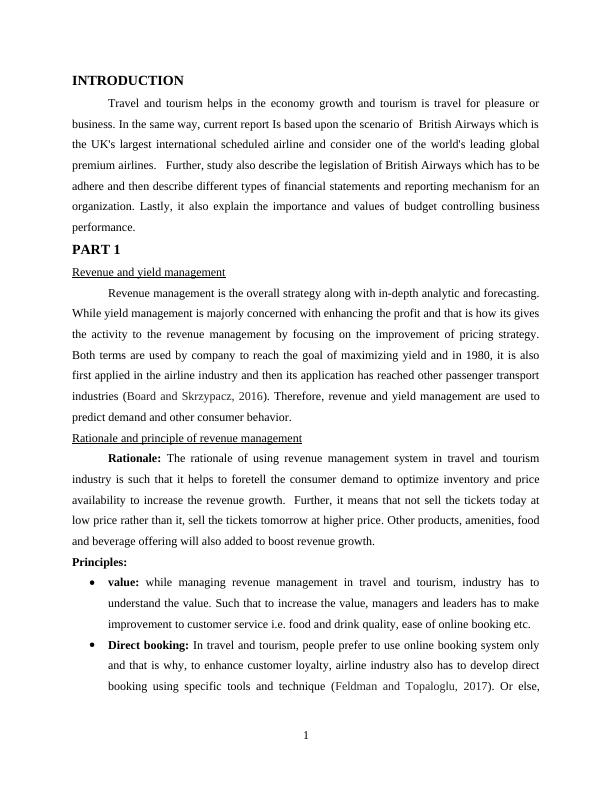
provide rewards to their passengers who have booked directly such that provide rewards,
lower reservation prices in future.
Demand forecasting: Another important principle in which manager of travel and
tourism industry make projected revenue, needs and cost by identifying the demand of
customers. Or else, through mapping the origin of demand, can also determine the
booking trends and forward the information to marketing department for future
initiatives.
Describing how airline industry applied revenue management tool
There are various tool which are used by the airline industry in order to generate and
maximize profit such that :
Capacity utilization: It is the most common tool which is also used by British Airways
such that airline capacity utilization is calculated by dividing revenue passenger miles
with the seat availability. Therefore, it refer to higher an airline's load factor, higher the
revenue and profit in an airline (Cetin, Demirciftci and Bilgihan, 2016). Such that when
the load factor increases in airline, then fixed cost is also spread and which leads to
higher rates of tickets.
Discount allocation: It is another tool of revenue management which refers to the pattern
of restricting the number of discounted airfares due to reserve seats or higher revenue
customer on the same flight. Thus, most airline offer two or three class services and each
is differentiated from their own attributes. After analyzing the demand and attract
customer, airline industry start offering discount price tickets on every class service that
helps to increase their revenue.
Duration control: Airlines are made to minimize the duration and that is why, majority
of the people uses airlines In order to control the time and providing the best facilities to
their customers (Pimentel, Aizezikali and Baker, 2018). Moreover, it is also analyzed that
to reduce the time and maximizing the profit, discount control is consider a good strategy
of revenue management.
Late booking strategies: another important strategy that helps to increase the revenue.
There are many circumstances where individual has to book tickets at urgent basis, at that
time, airline industry take high charges and this is consider as a revenue growth option.
2
lower reservation prices in future.
Demand forecasting: Another important principle in which manager of travel and
tourism industry make projected revenue, needs and cost by identifying the demand of
customers. Or else, through mapping the origin of demand, can also determine the
booking trends and forward the information to marketing department for future
initiatives.
Describing how airline industry applied revenue management tool
There are various tool which are used by the airline industry in order to generate and
maximize profit such that :
Capacity utilization: It is the most common tool which is also used by British Airways
such that airline capacity utilization is calculated by dividing revenue passenger miles
with the seat availability. Therefore, it refer to higher an airline's load factor, higher the
revenue and profit in an airline (Cetin, Demirciftci and Bilgihan, 2016). Such that when
the load factor increases in airline, then fixed cost is also spread and which leads to
higher rates of tickets.
Discount allocation: It is another tool of revenue management which refers to the pattern
of restricting the number of discounted airfares due to reserve seats or higher revenue
customer on the same flight. Thus, most airline offer two or three class services and each
is differentiated from their own attributes. After analyzing the demand and attract
customer, airline industry start offering discount price tickets on every class service that
helps to increase their revenue.
Duration control: Airlines are made to minimize the duration and that is why, majority
of the people uses airlines In order to control the time and providing the best facilities to
their customers (Pimentel, Aizezikali and Baker, 2018). Moreover, it is also analyzed that
to reduce the time and maximizing the profit, discount control is consider a good strategy
of revenue management.
Late booking strategies: another important strategy that helps to increase the revenue.
There are many circumstances where individual has to book tickets at urgent basis, at that
time, airline industry take high charges and this is consider as a revenue growth option.
2
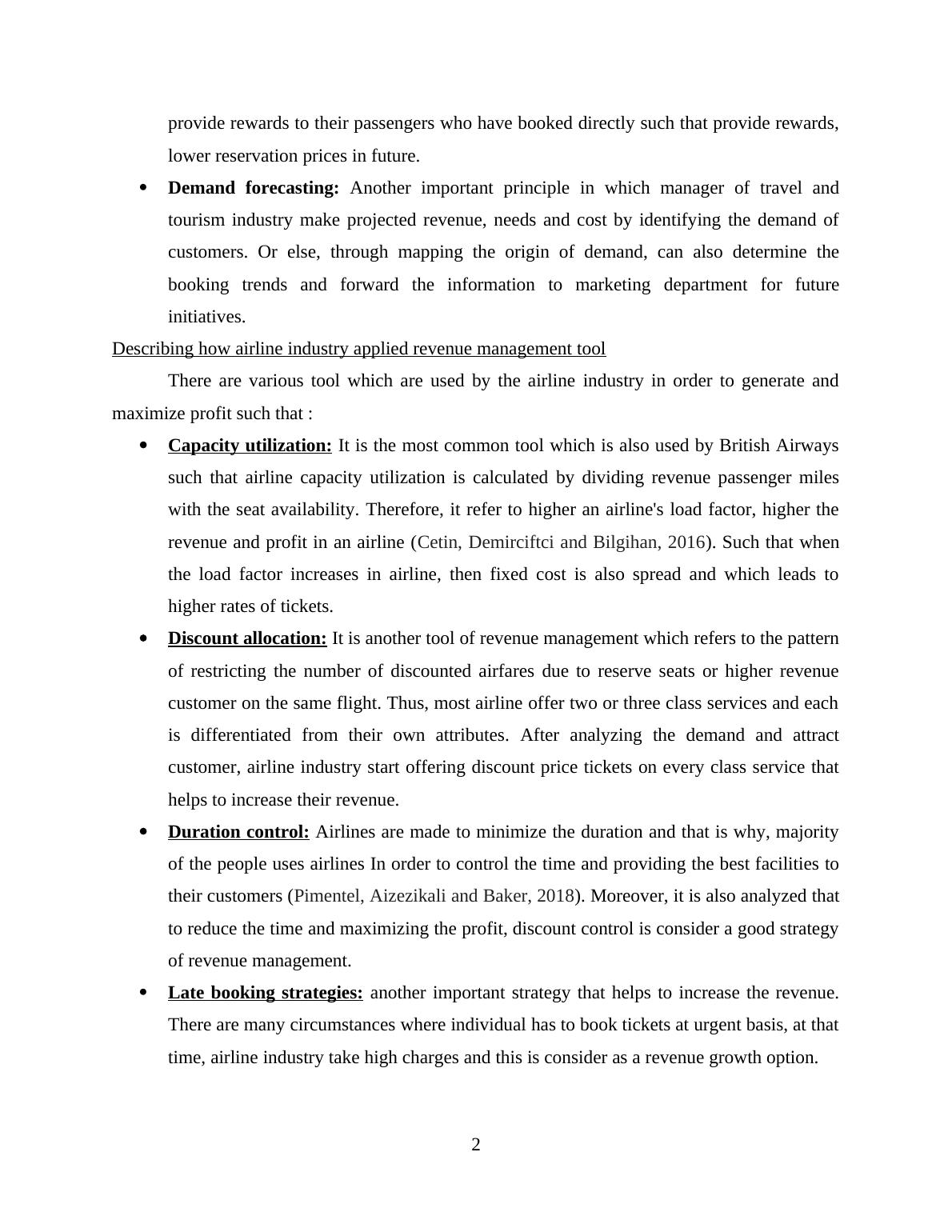
Impact of differentiated pricing strategies on revenue management
There are different pricing strategies which an airline industry used such that
Dynamic pricing strategy: Under this, the price is not firmly set and it keep changes as
per the circumstances such that increase in demand at some time, type of customer which are
targeted and changing market conditions (Yoon and Chow, 2020). Therefore, this type of
pricing strategy is helpful for airline industry but it can also used with product pricing as well.
Segmented pricing: In this, customer are charged more which is based on their
willingness to pay more for some specific products. For instance, in airline industry,
businessman also willing to pay a higher price for the airline ticket which allow them to fly mid-
week as well.
Peak user pricing: One of the most common strategy used for transportation business.
Such that in airline company charge higher during weekends as compared to week days and that
is why it helps the firm to increase their revenue and enhance their financial performance as
well.
Competitive pricing strategy: It is the pricing strategy in which the competitor's price
are taken into consideration while setting the price of the same products. Therefore, the focus is
on the competition driven prices as compared to production cost and overheads (Tong and et.al,
2020). This is also used by airline industry to stay ahead in the competition and gain profit.
Critically analyzing the principle of revenue management
Revenue management principle allow the airline industry to adopt the data driven
approach while taking decision. Thus, these principles are the way to ensure that informed
decision are made and thus, a business does it best to enhance the revenue. However it is
critically evaluated that without complying with the specific principles, airline industry did not
raise their revenue and this in turn creates negative impact upon business performance as well
(Guillet, 2020).
In addition to this, the application of using the revenue management is such that it helps
to include better ability in order to predict customer wants and needs, also helps to generate more
effective pricing strategy and an expansion in further market as well. Overall, using revenue
management within airline industry will help the company to increase the financial performance
of the company.
3
There are different pricing strategies which an airline industry used such that
Dynamic pricing strategy: Under this, the price is not firmly set and it keep changes as
per the circumstances such that increase in demand at some time, type of customer which are
targeted and changing market conditions (Yoon and Chow, 2020). Therefore, this type of
pricing strategy is helpful for airline industry but it can also used with product pricing as well.
Segmented pricing: In this, customer are charged more which is based on their
willingness to pay more for some specific products. For instance, in airline industry,
businessman also willing to pay a higher price for the airline ticket which allow them to fly mid-
week as well.
Peak user pricing: One of the most common strategy used for transportation business.
Such that in airline company charge higher during weekends as compared to week days and that
is why it helps the firm to increase their revenue and enhance their financial performance as
well.
Competitive pricing strategy: It is the pricing strategy in which the competitor's price
are taken into consideration while setting the price of the same products. Therefore, the focus is
on the competition driven prices as compared to production cost and overheads (Tong and et.al,
2020). This is also used by airline industry to stay ahead in the competition and gain profit.
Critically analyzing the principle of revenue management
Revenue management principle allow the airline industry to adopt the data driven
approach while taking decision. Thus, these principles are the way to ensure that informed
decision are made and thus, a business does it best to enhance the revenue. However it is
critically evaluated that without complying with the specific principles, airline industry did not
raise their revenue and this in turn creates negative impact upon business performance as well
(Guillet, 2020).
In addition to this, the application of using the revenue management is such that it helps
to include better ability in order to predict customer wants and needs, also helps to generate more
effective pricing strategy and an expansion in further market as well. Overall, using revenue
management within airline industry will help the company to increase the financial performance
of the company.
3
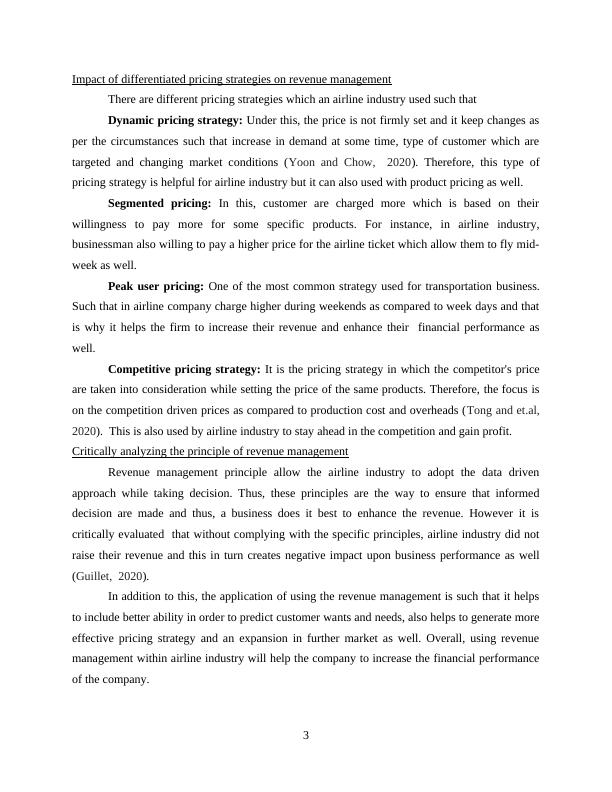
PART 2
4
4
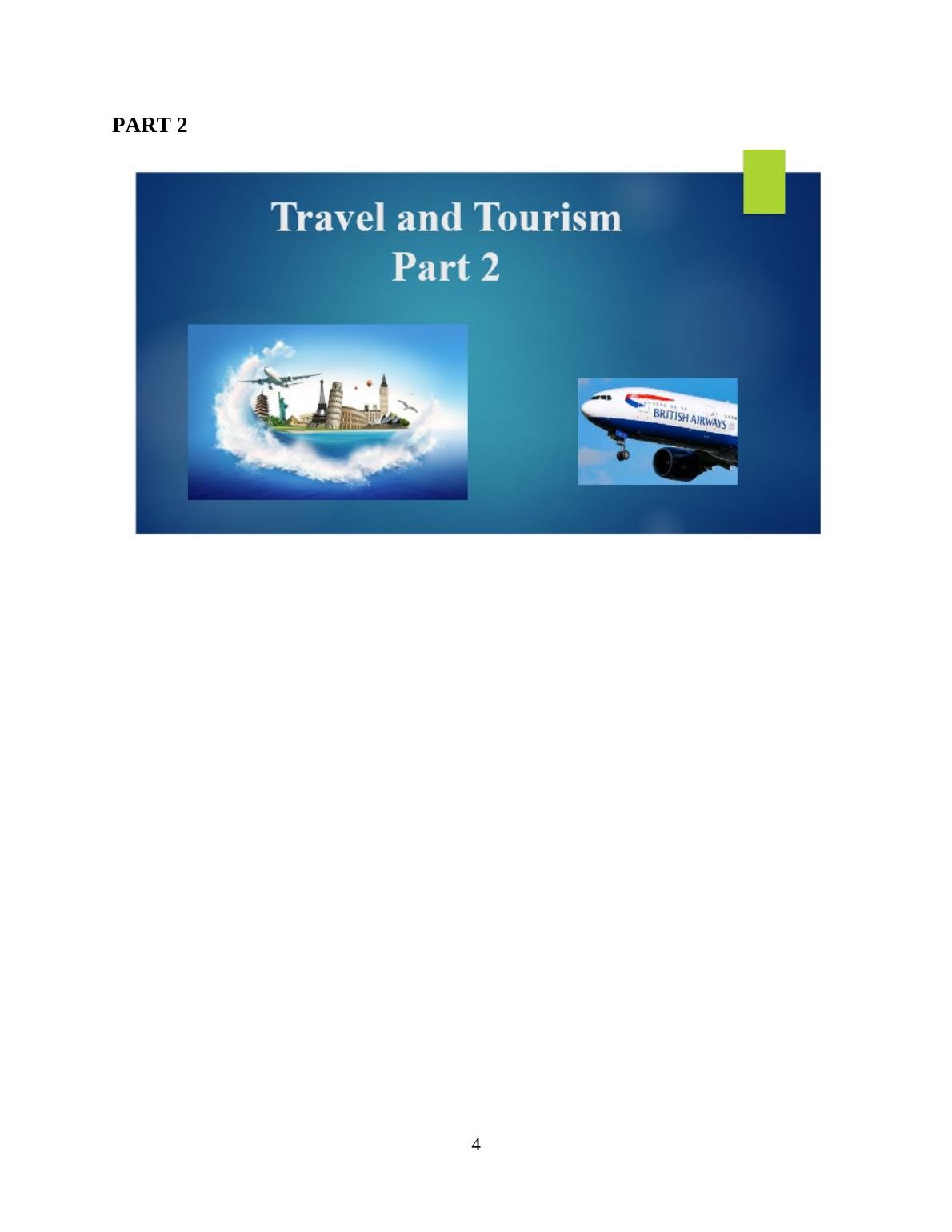
End of preview
Want to access all the pages? Upload your documents or become a member.
Related Documents
The Travel and Tourism Business Toolkit Assignment - British Airwayslg...
|10
|3097
|303
The Travel and Tourism Business Toolkit - Airline Industrylg...
|15
|3176
|391
Principle of Revenue Management for Hospitality Industrylg...
|18
|5234
|40
Travel and Tourism Business Toolkit Assignment Samplelg...
|14
|3147
|34
The Travel and Tourism Business Tool Kit : British Airwayslg...
|11
|2807
|28
The Travel and Tourism Business Toolkit Assignment - British Airways (BA)lg...
|12
|3067
|246